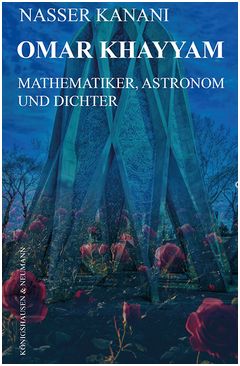Omar Khayyám in German Reformulations: Translation between Politics, Scholarship and Belief. Amir Theilhaber
In: Sufi non-conformism : antinomian trends in the Persianate cultural traditions. A.A. Seyed-Gohrab (ed.) Amsterdam : Leiden University Press, 2024. (Iranian Studies Series; 32) ISBN: 9789087284541. Pp. 203–226
Archives
A Polemic on Knowledge: An Analysis of Two Persian Quatrains
A Polemic on Knowledge: An Analysis of Two Persian Quatrains. A. Ghajarjazi
In: Sufi non-conformism : antinomian trends in the Persianate cultural traditions. A.A. Seyed-Gohrab (ed.) Amsterdam : Leiden University Press, 2024. (Iranian Studies Series; 32) ISBN: 9789087284541. Pp. 179–201
‘Umar Khayyám’s Transgressive Ethics and their Socio-Political Implications in Contemporary Iran
‘Umar Khayyám’s Transgressive Ethics and their Socio-Political Implications in Contemporary Iran. A.A. Seyed-Gohrab
In: Sufi non-conformism : antinomian trends in the Persianate cultural traditions. A.A. Seyed-Gohrab (ed.) Amsterdam : Leiden University Press, 2024. (Iranian Studies Series; 32) ISBN: 9789087284541. Pp. 155–177
Omar Khayyam. Mathematiker, Astronom und Dichter
Omar Khayyam. Mathematiker, Astronom und Dichter. Nasser Kanani. [S.l.], Köningshausen & Neumann, 2024. 466 p. ISBN: 9783826090257
Omar Khayyam (1048–1131) verfasste Abhandlungen über Mathematik, Astronomie, Physik und Mechanik sowie Theologie, Philosophie und Musiktheorie. Als Mathematiker befasste er sich mit kubischen Gleichungen und fand als Erster ihre Lösungen mithilfe von Kegelschnitten. Im Bereich der Geometrie widmete er sich dem Parallelenpostulat und gelangte zu einem Ergebnis, das die Entdeckung von nichteuklidischen Geometrien einläutete. Ferner gelang es ihm, als Erster die Binomialkoeffizienten zu bestimmen, die später zur Bewältigung zahlreicher Probleme der modernen Mathematik beitrugen. Als Astronom entwickelte er den weltweit genauesten Kalender. Dass er sich neben seinen bahnbrechenden wissenschaftlichen Arbeiten auch mit der Poesie beschäftigte, verheimlichte er jedoch seinen Zeitgenossen, und dies aus gutem Grund: Der damals vorherrschende religiöse Fundamentalismus duldete keinerlei glaubenskritische Äußerungen, schon gar nicht aus dem Munde eines Mannes, der als Autorität im islamischen Recht galt. Erst Jahrhunderte später erfuhr die Nachwelt von seinen Vierzeilern, Rūbā’ijāt, die in verschiedenen Quellen auftauchten. Nachdem sie Mitte des 19. Jahrhunderts in englischer Sprache erschienen, wurden sie als die schönsten Vierzeiler der Weltliteratur gefeiert. Die Übersetzungen seiner Vierzeiler liegen nun in fast allen Sprachen der Welt vor und sind ein Beweis für die anhaltende poetische Wirkung Khayyams und begründen auch die Weltgeltung der persischen Poesie.
Zwei deutsche Chajjam-Gesellschaften und ihre Gründer
Zwei deutsche Chajjam-Gesellschaften und ihre Gründer. Eine Spurensuche. Wilfried W. Meijer
In: Persica, vol. 28, (2023-2024), p. 59-127
Part of the Omar Khayyám story in the West is the history of the so called Omar Khayyám clubs. The first one was the Omar Khayyám Club of Londen, established in 1890 and still existing. A second club was the Omar Khayyám Club of America, founded in 1920. A century after the English club a Dutch club was founded in 1990, that too is still alive: the Nederlands Omar Khayyám Genootschap. However, there was also a club in Germany: die Deutsche Chajjam Gesellschaft (DCG) in Tübingen. Other than the mentioned clubs this Gesellschaft was rather a company or enterprise than a society. Its primary purpose was publishing and promoting the work of its founder, Chr. Rempis, who contributed significantly to the study and understanding of Khayyám’s rubáiyát. Unknown to this day however is the story of a second German Gesellschaft. It was founded in Osnabrück in 1949 by Th.F.K. Krohm. Whereas the Tübingen Gesellschaft became known through Rempis’ translations and studies, the Osnabrück club hardly evoked publicity despite its ambitious name: die Omar Khayyam-Gesellschaft zur Pflege iranischer Literatur (OKG).
Untersuchung zur Rezeption persischer Lyrik in der europäischen Kunstmusik
Untersuchung zur Rezeption persischer Lyrik in der europäischen Kunstmusik am Beispiel der Werke von Saʿdī, Ḥāfeẓ und ʿOmar Ḫayyām. Elgaz Pegah. Heidelberg : Universitätsbibliothek Heidelberg, 2024.
Quatrains of Many Receptions
Quatrains of Many Receptions: A Survey of Perceptions of ‘Omar Khayyām in Ottoman and Turkish Translations. Efe Murat Balıkçıoğlu
In: Iranian Studies, Vol. 57 (2024), 2, pp. 221–239
This article explores the wide range of responses to Persian polymath and poet ‘Omar Khayyām (d. ca. 526/1132) in Ottoman and Turkish literary sources. There is an extensive bibliography of translations and secondary literature.

